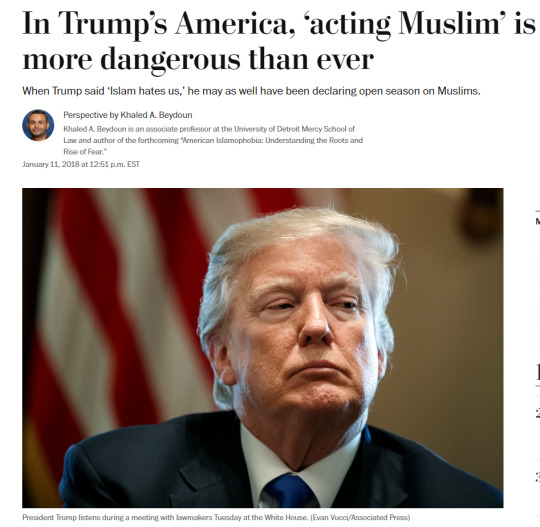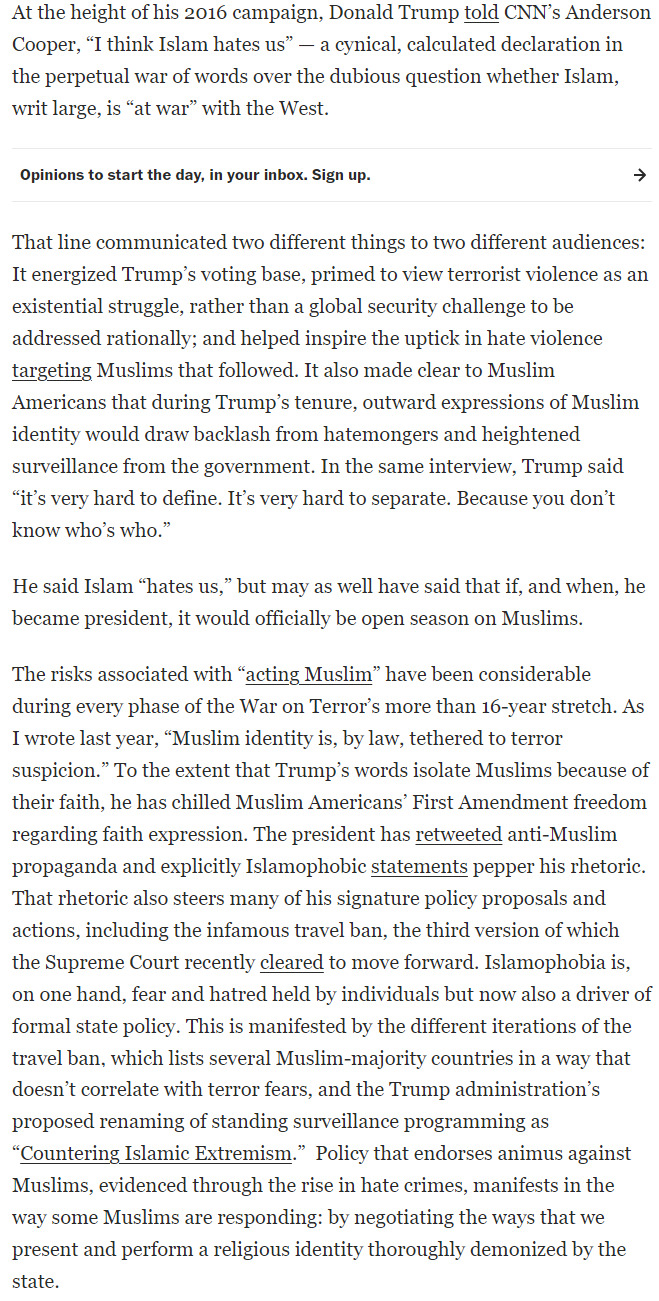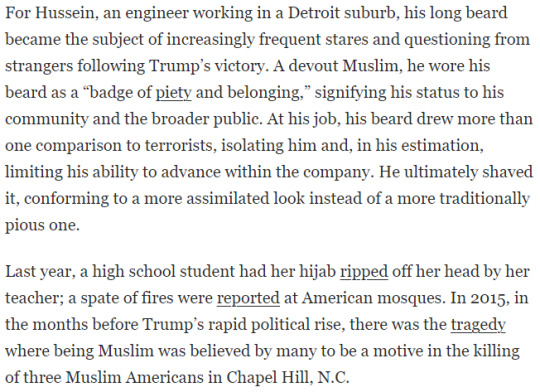#Hussein Beydoun
Text
He is so handsome! Fit or not! I mean look at him!
#belly#weight gain#male weight gain#exjock#beginner belly#bulking#fat butt#handsome#sexy#cute#Hussein Beydoun#hussbey#fit2fat#fit to fat
327 notes
·
View notes
Text





This post in in relation to THIS post
------------------------------------------------------------------------------
[id: all text from article:
In Trump’s America, ‘acting Muslin’ is more dangerous than ever
When Trump said ‘Islam hates us,’ he may as well have been declaring open season on Muslims.
Perspective by Khaled A. Beydoun
Khaled A. Beydoun is an associate professor at the University of Detroit Mercy School of Law and author or the forthcoming “American Islamophobia: Understanding the Roots and Rise of Fear.”
January 11, 2018 at 12:51p.m. EST
[picture of Trump]
At the height of his 2016 campaign, Donald Trump told CNN’s Anderson Cooper, “I think Islam hates us” – a cynical, calculated declaration in the perpetual war of words over the dubious question whether Islam, writ large, is “at war” with the West.
That line communicated two different things to two different audiences: It energized Trump’s voting base, primed to view terrorist violence as an existential struggle, rather than a global security challenge to be addressed rationally; and helped inspire the uptick in hate violence targeting Muslims that followed. It also made clear to Muslim Americans during Trump’s tenure, outward expression of Muslim identity would draw backlash from hatemongers and heightened surveillance from the government. In the same interview, Trump said “it’s very hard to define. It’s very hard to separate. Because you don’t know who’s who.”
He said Islam “hates us,” but may as well have said that if, and when, he became president, it would officially be open season on Muslims.
The risks associated with “acting Muslim” have been considerable during every phase of the War on Terror’s more than 16-year stretch. As I wrote last year, “Muslim identity is, by law, tethered to terror suspicion.” To the extent that Trump’s words isolate Muslims because of their faith, he has chilled Muslim American’s First Amendment freedom regarding faith expression. The president has retweeted anti-Muslim propaganda and explicitly Islamophobic statements pepper his rhetoric. That rhetoric also steers many of his signature policy proposals and actions, including the infamous travel ban, the third version of which the Supreme Court recently cleared to move forward. Islamophobia is, on one hand, fear and hatred held by individuals but now also a driver formal state policy. This is manifested by the different iterations of the travel ban, which lists several Muslim-majority countries in a way that doesn’t correlate with terror fears, and the Trump administration’s proposed remaining and standing surveillance programming as “Countering Islamic Extremism.” Policy that endorses animus against Muslims, evidenced through the rise of hate crimes, manifests in the way some Muslims are responding: by negotiating the ways that we present and perform a religious identity thoroughly demonized by the state.
These negotiations are unfolding within the private confines and minds of Muslims, largely under the radar of media converge and frequently unseen by the public eye. Muslims are being forced to choose between confirming their Muslim identities in line with their religious belief and, in turn, leaving themselves vulnerable to hate violence and state suspicion. Or concealing their Muslim identities, conforming and, at least in theory, trading their rights for safety.
Alaa Basatneh chose to cover her Muslim identity by uncovering. In 2016, she wrote for Splinter that “Immediately after Donald Trump was elected president, I decided to stop wearing my hijab.” She was motivated to try to find safe haven from the wave of violence targeting covered Muslim women – the most readily identifiable Muslims – who wind up as primary targets of Islamophobic violence.
[Trump said Obama’s nuclear deal would empower Iran. He’s wrong.]
For Hussein, an engineer working in a Detroit suburb, his long beard became the subject of increasingly frequent stares and questioning from strangers following Trump’s victory. A devout Muslim, he wore his beard as “a badge of piety and belonging,” signifying his status to his community and the broader public. At his job, his beard drew more than one comparison to terrorists, isolating him and, in his estimation, limiting his ability to advance within the company. He ultimately shaved it, conforming to a more assimilated look instead of a more traditionally pious one.
Last year, a high school student has her hijab ripped off her head by he teacher; a spate of fires were reported at American mosques. In 2015, in the months before Trump’s rapid political rise, there was the tragedy where being Muslim was believed by many to be a motive in the killing of three Muslim Americans in Chapel Hill, N.C.
Strategic concealment of stigmatized identity is not exclusive to Muslim communities. For instance, otherwise devout Sikh men may remove their turbans or shave their beards to fend off discrimination, and black men and women may avoid specific hairstyles or attire to deflect stereotyping of mitigate the prospect of police profiling.
“Everybody works their identity,” write law professors Devon Carbado and Mitu Gulati in their 2000 Cornell Law Review paper, “Working Identity,” examining the ways that professionals of color negotiate their racial identities within the employment context. They argue that the “working identity phenomenon … is a form of employment discrimination,” because concealment of modification of identity in ways that lessen racial, gender and intersectional stereotypes facilitate acceptance and upward mobility in the employment context. When you extend that perspective to the acting Muslim phenomenon, we can see it as a form of religious discrimination.
For Muslims navigating how to present themselves and practice their faith in a society that where Islamophobia is both percolating from the bottom and reigning at the very top, the stakes are more than getting and holding a coveted job or breaking through glass ceilings. It is a matter of weathering the immediate threat posed by the Trump administration, which will undoubtedly continue to peddle hateful rhetoric and push more damaging policy.
Hate crime reports and statistics don’t capture the full scope of hostility towards Muslims in our country. And if the law is too limited to enable redress for Muslims suppressing their religious identity to mitigate backlash and rebut suspicion, it may be time to rethink it. If one of the touchstones of American citizenship is the free exercise of religion, and Muslims are unable to fully practice that liberty in a context of trumped-up Islamophobia, then the law serves to maintain the second-class citizenship of Muslims in America. /id]
#donald trump#muslim#arabic#middle east#islam#muslim american#president#politics#islamophobia#trump presidency#racism#first amendment#religion#discrimination
0 notes
Text
Nearly 300 Intellectuals Mobilize Against the Rise of a ‘Fascist Climate’ in Lebanon
The following text is translated from the original article in L’Orient Le Jour and entitled ‘Près de 300 intellectuels se mobilisent contre l’émergence d’un « climat fasciste » au Liban‘. Note that the petition is still open so there are more names being added as we speak. For the Arabic version, click here.
This initiative comes after the polemic surrounding refugees that has degenerated in the past two weeks on social media, notably after the death under torture of Syrian detainees, an issue brought up by many human rights organizations in the aftermath of a raid launched by the Lebanese authorities in Arsal refugee camp.
The polemic was quickly replaced by a wave of hatred accompanied by a xenophobic discourse and culminating in a video showing Lebanese citizens beating up a Syrian refugee, men who were later arrested.
Journalist, writer and poet Youssef Bazzi, who is among those at the origin of the petition, explains that “the objective is not only to rise up against ongoing racist practices”. “Beware! A fascist climate, a militaristic and repressive climate, is slowly taking place. It does not merely aim at supporters of the Syrian revolution or at those who oppose Hezbollah’s interference in Syria”, Bazzi tells L’Orient-Le-Jour, adding that Lebanon is currently suffering from power dynamics in Syrian, currently favoring the Syrian regime and Hezbollah.
Youssef Bazzi adds:
“This climate is an extension of a political atmosphere recently created by those in power, by a political elite that, despite its differences, agrees to remain in power. There exists as well a will to smother any attempts by the civil society to address important topics such as the defense of the constitution, the rule of law, civil liberations and the public order. The problem is therefore not limited to racist practices towards refugees, it goes back to the very essence of our Lebanese identity. Must our identity be compartmentalized and full of hate, or founded on values?”
For the writer, it goes without saying that Lebanese society needs to multiply its cultural, legal, political and humanitarian initiatives to create a real public opinion and reverse the rising trend.
The letter reads:
We, the underlined Lebanese activists, writers, intellectuals, journalists and artists, based on our faith in a Lebanon of freedom, pluralism and that respects human rights, and on our conviction that the national army must be the only armed entity in this country, categorically reject and condemn certain disgusting practices against Syrian civilians that were forced to find refuge in Lebanon.
What follows these practices, such as the campaigns of incitement to hatred against Syrians across social media and in certain media outlets, or via declarations by certain politicians, is no less ugly as the criminal practices themselves. These do not just attack Syrians but the image of Lebanon itself and the conscience of the Lebanese. This does not represent us, but puts us in front of extreme options, including the need to purge our patriotism from its chauvinism. The position adopted towards refugees must become one of the criteria of our patriotism through which we want to consolidate democracy and the respect of human rights.
List of signatories so far [If possible, I would like to add my name to the list]
Ahmad Ismaïl, Ahmad Soueissi, Ahmad Issawi, Ahmad Kaabour, Ahmad Fayçal Sankari, Ahmad Mrad, Oussama Wehbé, Ismaïl Charafeddine, Akram Zaatari, Akram Arawi, Akram Mahmoud Mahmoud, Alexandra Habib, Alexandre Paulikevitch, Élias Bejjani, Élias Khoury, Élias Fawz, Aline Milad el-Chami, Amal Takouch, Émile Menhem, Indira Matar, Antoine Abou Zeid, Antoine Haddad, Antoine Courban, Aya Naboulsi, Élie el-Hage, Ayman Hmeïdane, Ayman Nahlé, Bachar Haïdar, Bachar Ziad Halabi, Béchara Charbel, Béchara Atallah, Paul Taber, Bachir Osmat, Boutros Moawad, Bikr Solh, Bissane el-Cheikh, Taymour Brich, Thaër Ghandour, Jad Yateem, Jacqueline Saad, Jean-Pierre Frangié, Jamal Assi, Joumana Haddad, Jamil Hammoud, Georges Massouh, Joseph Badaoui, Gisèle Khoury, Hazem el-Amine, Hazem Saghiyé, Habib Bzeih, Habib Nassar, Habib Darwiche, Houssam Itani, Hassane Hammoud, Hanna Saleh, Hassan Chami, Hassan Kotb, Hassan Krayem, Khaled Hussein el-Houjeiri, Khaled Sbeih, Khaled Izzi, Khaled Yassine, Dalia Obeid, Dana Kahil, Dalal Bizri, Diana Moukalled, Diala Haïdar, Dima Charif, Dima Krayem, Raëd Abou Chacra, Rached Fayed, Rania Jaroudi, Racha el-Atrache, Racha el-Amir, Rafic Ftouh, Roula Mouwaffaq, Rana Eid, Rana Najjar, Rony el-Assaad, Rayane Maged, Rima Maged, Rim el-Jundi, Rima Nakhel, Rida el-Maoula, Rawan Halaoui, Raëd Bou Hamdane, René Moawad, Rouba Beydoun, Roudeina Baalbacki, Zaki Taha, Zahia Safa, Ziad Maged, Ziad Abdel Samad, Ziad Antar, Zeina Mansour, Tarek Tamim, Tarek Succariyé, Tarek Hawa, Talal Khoury, Ralal Tohmé, Tony Chakar, Tony Francis, Sara Chahine, Salem Maarabouni, Samer Dabliz, Saad Faour, Saoud el-Maoula, Samar Mogharbel, Semaan Khawam, Samir Zaatiti, Samir Alwane, Sanaa Salhab, Siham Harb, Souhail Nasser, Sawsan Abou Zohr, Célina Hamadé, Chadi Hanouche, Charles Chehwane, Chadha Charafeddine, Shirine Abou Chacra, Sobhi Amhaz, Sobhi Mahdi Abdallah, Souhaid Jawhar, Abbas Abou Zeid, Abbas el-Jawhari, Abbas Nasser, Abdel Rahmane Ayyas, Abdel Ghani Imad, Abdallah Haddad, Abdel Mottaleb Bakri, Abdel Nasser Succariyé, Abed Kreidiyé, Abdel Wahhab Badirkhan, Adnane Salamé, Izzat Charara Beydoun, Akl Awit, Ali Ahmad Rabah, Ali el-Hajj Sleimane, Ali el-Sayyed, Ali el-Merhebi, Ali Hajo, Ali Hammoura, Ali Zaraket, Ali Charafeddine, Ali Tayy, Ali Cheaib, Ali Izzeddine, Ali Mohammad Hassan el-Amine, Ali Mrad, Ali Makki, Imad Dirani, Imad el-Chidiac, Imad Ftouh, Imad Komeiha, Omar Harkouss, Ghada Araïbi, Ghita Daher, Fady Toufeily, Fady Toufic, Fady Melhem, Farès Khachane, Farouk Yaacoub, Fatima Houhou, Fatima Mourtada, Firas Abou Hatoum, Fadil Hammoud, Fouad el-Mokaddem, Fouad Salamé, Fawzi Zebiane, Fawzi Ferry, Fawzi Yammine, Kassem Kassir, Kassi Charara, Kamal Aziz Nassif, Chrystelle Khodr, Lokman Slim, Louma Rabah, Luna Safwan, Layla Masri Jundi, Liliane Daoud, Lina Sahhab, Mark Daou, Maria Georges Khayssi, Maher Abou Chacra, Maher Itani, Maya Khadra, Maya Fidawi, Mike Ayyache, Mohsen Hussein, Moustapha Ahmad, Moustapha el-Turk, Moustapha Fahs, Mohammad Ahmad Choumane, Mohammad el-Houjeiri, Mohammad el-Aziz, Mohammad Anouar Baassiri, Mohammad Badawi, Mohammad Chami, Mohammad Chbaro, Mohammad Awada, Mohammad Mekkaoui, Mohammad Mikati, Mohammad Hammoud, Mahmoud Soueid, Mahmoud Doha, Mohammad Kassem, Marwan Abi Samra, Marwan Georges el-Najjar, Massoud Younès, Motaz Fakhreddine, Makram Rabah, Manar Wehbé, Manale Nahhas, Mona Jahami, Mona Khoueiss, Mona Fayad, Mohannad el-Hage Ali, Maha Bidawi, Maha Aoun, Monica Borgmann Slim, Mirella Salamé, Michel Hajji Georgiou, Michel Doueihy, Mayssam Hindi, Mimosa Arawi, Nader Fawz, Nafeh Saad, Nadine Labaki, Nadine Ferghol, Nahed Youssef, Nabil Halabi, Nabil Ismaïl, Nabil Abdel Fattah, Nada Abdel Samad, Nadim Houry, Nadim Koteich, Nehmé Mahfoud, Nawal Moudallali, Nour Blok, Hani Minkara, Hachem Adnane, Hoda Husseini Fayed, Hoda Chehabeddine, Hicham Bou Nassif, Hicham Zeineddine, Hanaa Jaber, Hind Darwish, Hovic Habchian, Hiyam Halawi, Haytham Chamas, Haytham Hilal, Wassef Khalaf, Wadih Mazraani, Wissam Saadé, Walid Hussein, Walid Fakhreddine, Yakzan Takki, Yorgi Tayrouz, Youssef el-Khalil, Youssef Bazzi et Yolla el-Hage.
Filed under: Politics & Society
0 notes